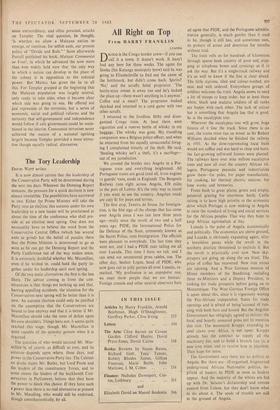All Right on Top
From HARRY FRANKLIN
LUANDA
D.0 is the Congo border town—if you can call it a town, It doesn't work. It hasn't had any beer for three weeks. The agent for Simba (the Katanga monopoly brew) said he was going to Elisabethville to find out the cause of the bottleneck, but didn't come back. Spirits? 'No,' said the scruffy hotel proprietor. 'The bottle-store owner is away too and he's locked the place up—there wasn't anything in it anyway.' Coffee and a meal? The proprietor looked shocked and returned to a card game with two other scruffs.
I returned to the foodless, filthy and disor- ganised Congo train. At least there were cigarettes and a reserve bottle of whisky in my baggage. The whisky was gone. My travelling companion was a Belgian police officer, and when he returned from his equally unsuccessful forag- ing I complained bitterly of the theft. He said, 'Stealing whisky isn't a theft, it's a sacrilege— out of my jurisdiction.'
We crossed the border into Angola in a Por- tuguese train and everything brightened. All Portuguese trains are good (and all, from engines to guards' vans, made in England). The Benguela Railway runs right across Angola, 838 miles to the port of Lobito It's the only way to travel if you want to see the country. Angolan roads are only fit for jeeps and lorries.
The first stop, Texeira de Sousa, for Immigra- tion, is the first sign of the change that has come over Angola since I was last here three years ago—really since the revolt of two and a half years ago. PIDE, the International Police for the Defence of the State, commonly known as the Secret Police, runs Immigration. The officials were pleasant to everybody. The last time they were not, and I had a PIDE man tailing me all over Luanda. This time 1 have no tail, and I can send out uncensored press cables, too. The other day, Senhor Lopez, head of PIDE, who now goes out to jolly' parties all over Luanda, re- marked, 'My profession is an unpopular one, we must show people that we are human.' Foreign consuls and other neutral observers here all agree that PIDE, and the Portuguese adminis- tration generally, is much gentler than it used to be, though it still has, and sometimes uses, its powers of arrest and detention for months without trial.
The train rolls on for hundreds of kilometres through sparse bush country of poor soil, stop- ping at telephone boxes and crossings as if to ask the way. But it's a single-track railway and it's as well to know if the line is clear ahead. The little stations, tiled and colour-washed, are neat and well ordered. Everywhere groups of soldiers welcome the train. Angola seems to need a lot of troops to keep order, but at least these white, black and mulatto soldiers of all ranks are happy with each other. The lack of colour bar is something that Angola has that is good. So is the eucalyptus tree.
Wherever the eucalyptus tree will grow, huge forests of it line the track. Since there is, no coal, the trains must run on wood as Sir Robert Williams decided when he finished the railway in 1931. As the slow-rejuvenating local bush would not suffice and was hard to chop and burn, the fast-growing softwood forests were planted. The railways have over nine million eucalyptus trees and now all over the country African vil- lagers, Portuguese peasants and industrialists grow them—for poles, for paper manufacture, for cooking, for thermal electric stations. for lime works and breweries.
From bush to great plains, green and empty, potential grazing for enormous herds. Cattle raising is to have high priority in the economic drive which Portugal is now making in Angola to raise the standard of living and social services for the African peoples. That way they hope to keep African nationalism at bay.
Luanda is the pulse of Angola, economically and politically. The economics are above ground, and Luanda is obviously expanding again, after a breathless pause while the revolt in the northern districts threatened to encircle it. But the revolt is practically over now. New sky- scrapers are going up along the sea front. The price of coffee has recovered New iron mines are opening. And a West German mission of fifteen members of the Bundestag, including three ex-Ministers and a Deputy President, is looking for trade prospects before going on to Mozambique. The West German Foreign Office is upset about this, since it is vigorously wooing the Pan-African independent States for trade openings and is afraid of being-accused of run- ning with both hare and hound. But the Angolan Government has obligingly agreed to instruct the local and heavily censored press not to mention this visit. The mammoth Krupps, extending its steel claws over Africa, is not upset. Krupps already has the contract to supply all the machinery for, and to build a branch line to, a new iron mine, and to receive iron in p5yMent. They hope for more.
The Government says there are no politics in Angola. But there are---ill-organised, fragmented underground African Nationalist politics, de- priveil of leaders by PIDE as soon as leaders appear. And the majority of the whites are fed up with Dr. Salazar's dictatorship and remote control from Lisbon, but they don't know what to do about it. The seeds of trouble are still in the ground of Angola.






































 Previous page
Previous page